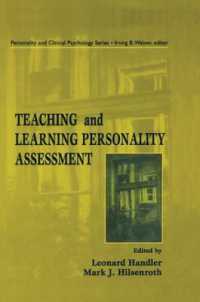- ホーム
- > 洋書
- > 英文書
- > Politics / International Relations
Full Description
The Oxford Handbook of Child-Centered Approaches to Migrant Children aims to bring child-centered approaches as applied to researching child migration to the forefront of academic and policy debates on this topic. The chapters included in this volume cover the key debates in the field and provide important insights about recent developments in areas that inform use of the child-centered approach.
The concept of the child-centered approach is widely recognized in the social sciences and humanities, including sociology, anthropology, education, psychology, social policy, and law. This approach, whether applied in research, policymaking, or practice, is based on children's agency and participation and focuses specifically on their experiences, perspectives, and voices. To this end, the child-centered approach privileges children when designing research questions, providing descriptions, making interpretations, and carrying out analyses.
By pairing the child-centered approach with concepts such as agency, voice, well-being, participation, and intergenerational justice that are used in contexts relevant to migrant children, this Handbook presents the major theoretical premises, epistemological approaches, and models used in different social settings and spheres, including research, education, and the political realm. It also describes the experiences of researchers in applying child-centered methods and approaches to their work and highlights the importance of ethical considerations and continuous reflexivity in relation to child-centered knowledge production. The Handbook additionally highlights the complexity and diversity of transnational childhoods from around the globe, as well as presenting the experiences of different migrant groups, including undocumented and irregular migrants, asylum seekers, economic migrants, and left-behind children. Lastly, it examines the fundamental legal principles and aspects of participation in relation to specific procedures, policy areas, and legal categories relevant to migrant children.
Contents
Acknowledgments
About the Editors
Contributors
Preface
1. Introduction: The Child-Centered Approaches to Migrant Children
Barbara Gornik, Zorana Medaric, and Mateja Sedmak
Part I: Concepts and Models
2. Characteristics and Challenges of Child-Centered Approach with Migrant Children
Zorana Medaric
3. The Social Conditions of (Migrant) Children's Agency in Global Society
Claudio Baraldi
4. The Five-Dimensions Model of Migrant Children's Subjective Well-Being
Sabine Andresen and Barbara Gornik
5. Migrant Children as Agents in the Adult-Centered Political Space
Barbara Gornik
6. Against Adultism in Research with and about Migrant Children: Outlines of a Child-Centered Approach
Urszula Markowska-Manista and Manfred Liebel
7. Transforming Participation of Children of Migrant Origin in Research Projects
Shoba Arun and Jesicca Ozan
8. Fostering Child Centered Educational Settings for Students of Immigrant Origin
Carola Suarez-Orozco
9. An Intergenerational Justice Approach to the Sustainable Support of Migrant Children
Judi Mesman
Part II: Methods and Approaches
10. Ethical Challenges in Researching Migrant Children
Zorana Medaric
11. Migrant Children as Co-Constructors and Advisors in Research
Deirdre Horgan, Shirley Martin, Jacqui O'Riordan, Reana Maier, and the IMMERSE Children and Young People's Advisory Group
12. Positional Multi-Method Approach to Elicit Migrant Children's Subjectivities
Chiara Massaroni
13. Participatory Visual Methods in Child-Centered Migration Research
Søren Sindberg Jensen and Gro Hellesdatter Jacobsen
14. Migrant Children's Photography as Transformative Practice in Early Childhood Education
Annika Åkerblom
15. Storyboard Peers: A Child-Centered, Peer-Mediated, Visual and Narrative Approach to Research and Practice with Forced Migrant Youth
Jessica Ball
16. Philosophy with Children (PwC) as a Pedagogical Approach and Research Method
Søren Sindberg Jensen
17. Autobiographical Life Stories of Migrant Children through a Child-Centered Lens
Mateja Sedmak
18. Child-Centered Approaches in Digital Research with Migrant Children
Koen Leurs
19. A Child-Centered Approach to Longitudinal Data Collection
Haridhan Goswami and Gary Pollack
Part III: Voices and Perspectives
20. Migrant Children's Experiences and the State-Centered Regimes in Colombia
Nohora Constanza Niño Vega
21. Legal Consciousness and Agency of Unaccompanied Migrant Children on the Move
Bastien Roland and Annalisa Lendaro
22. Child Guides and Migration in the U.S.-Mexico Border Region
Kate Swanson, Rebecca Maria Torres, and Sarah Blue
23. Young Children's Learning Environments in East African Refugee Camps
Nerea Amorós Elorduy
24. Ghanaian Transnational Households and the Children "Left Behind"
Michael Boampong and Jahan Foster Zabit
25. Girls' Irregular Migration, Return and Reintegration in Somaliland
Fathima Azmiya Badurdeen
26. Intersectional Perspective on Migrant Children's Integration in Austrian Schools
Stella Louise Wolter, Rosa Tatzber, and Birgit Sauer
27. A Case Study Exploring the Integration Experiences of Child Migrants in Malaysia
Thavamalar Thuraisingam, Jason James Turner, and Kelly Tee Pei Leng
28. Romani Refugee Youth Perspectives on School and Work in Canada
Sara Swerdlyik
Part IV: Policy and Legal Issues
29. Migrant Children's Participation in Political and Democratic Life
Barbara Janta and Michaela Bruckmayer
30. A Child-Centered Approach to Representing Children in Immigration Legal Systems
Laila L. Hlass and Lindsay M. Harris
31. A Child-Centered Approach to Asylum Policy and Practice
Nancy Kelly and John Willshire Carrera
32. Benefit of the Doubt and Presumption of Minority in Age Assessment
John Dorber and Mark Klaassen
33. A Child-Centered Perspective and EU Integration Policies
Veronika Bajt and Vlasta Jalusic
34. Promoting Migrant Children's Rights by Developing Child-Centered Information
Helen Stalford and Tilly Clough








